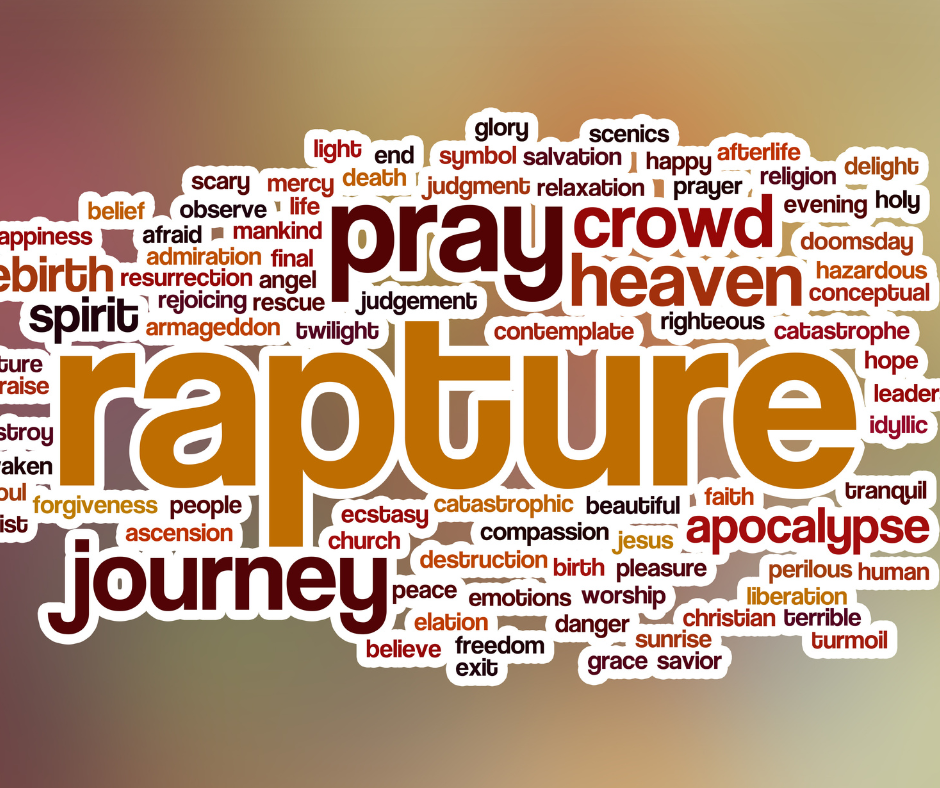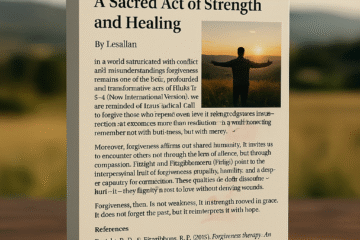Written by Lesallan – 04/19/2023
Student at Ohio Christian University

The Biblical Basis of the Rapture
Lesallan Bostron
BIB3560 Revelation (ONLSP23)
Ohio Christian University
Pastor Alexander Soultz
April 19, 2023
The Biblical Basis of the Rapture
Rapture is based on the concept that Jesus Christ will return to Earth and take away His faithful followers before tribulation and judgment. There are two passages found in the New Testament that the Biblical basis for rapture has been based on: “Then we which are alive and remain shall be caught up together with them in the clouds, to meet the Lord in the air: and so shall we ever be with the Lord” (1 Thessalonians 4:17, KJV); and “In a moment, in the twinkling of an eye, at the last trump: for the trumpet shall sound, and the dead shall be raised incorruptible, and we shall be changed” (1 Corinthians 15:52, KJV). In these passages, we can see how believers, both the living and the dead, will be transformed and caught up with Jesus Christ in the air.
There is a lot of debate and disagreement among Christians and scholars on interpreting these passages and the rapture’s timing. Many believe it will happen before the tribulation, while others think it will happen in the middle of the tribulation. Then some believe it will happen after the tribulation. In the amillennialism view, many do not believe in a literal tribulation. Then others, the Biblical scholars, and the Christians of this world we live in today will argue and say that it is a false doctrine that has no Biblical basis. Argue that the rapture contradicts other passages that speak of Jesus Christ’s visible and glorious return to judge the world and again reign on Earth. Like anything in the Bible, there are always two sides or many ways and perspectives, and views of arguing a point or a particular verse.
To articulate this student’s view of the rapture, it would have to be said that his understanding is based on the Biblical text and its theological framework. This student can also say that, in his personal view, rapture is not a matter of salvation or essential doctrine. His personal beliefs should not cause division or hostility among other Christians. This student is always open to learning from other views. Like any good Christian, we must respect all different views and opinions.
LaHaye’s views on the rapture are based upon his pre-tribulation interpretation of Biblical prophecy. He believed Jesus Christ would return to take His faithful followers from Earth before seven years of tribulation and judgment. LaHaye also thought the rapture was imminent and could happen at any given moment. He believed that current events are the signs of the end of time. This author has written several books and novels that promote his personal views. The left behind series and the Rapture: In the Twinkling of an Eye (LaHaye, 2010).
In “Is the Rapture Doctrine Biblical” (Witherington III, 2014), Ben Witherington says that the rapture doctrine is not Biblical, but a new idea developed in the nineteenth century by John Nelson Darby and then popularized by the Scofield Reference Bible and the “Left Behind series.” He has argued that passages are frequently used to support the rapture doctrine. These passages can be found in the Books of Matthew chapter twenty-four and 1 Thessalonians 4. These passages do not teach a secret nor the removal of believers from this Earth and this thing called the world. Instead, these passages teach us of a rather public and glorious return of Jesus Christ—the return of Jesus to judge the world and those chosen to share the message. Witherington has challenged the dispensationalist framework that underlies the rapture doctrine. Instead, Witherington proposes that there is a more historical and contextual reading of Biblical texts.
Witherington has stated that rapture theology is still yet a new idea. This theology emerged in the nineteenth century from the teachings of John Nelson Darby. Darby was a preacher who divided history into seven dispensations and claimed that the church would be taken away (secretly) before the tribulation period. Again, Witherington argues that rapture theology is not Biblical. Witherington says it is a misrepresentation of passages found in the New Testament Books of Matthew 24 and 1 Thessalonians 4 which is a misinterpretation and ignores the historical and literary context.
The word “rapture” is not mentioned explicitly in the Book of Revelation, but some Christians believe some passages refer to the rapture event. One of these passages “Because thou hast kept the word of my patience, I also will keep thee from the hour of temptation, which shall come upon all the world, to try them that dwell upon the earth” (Revelation 3:10, KJV). In this passage, Jesus promises to keep the church from the “hour of trial” that will come upon the world. In Revelation, many believe the church will be raptured before the tribulation period, as described in Revelation 6-18. John hears a voice like a trumpet saying, “Come up here” he is then taken to heaven (Revelation 4:1-2). The third, fourth, and fifth passages in Revelation support rapture. In the passage, a woman gives birth to a male child who is “caught up” to God and His throne (Revelation 12:5); the woman is identified as Israel and the child of God, identified as the true child of the church. This image is also seen as another picture of rapture. In Revelation 14:14-16, what has been seen? There is one like the Son of Man who sits on a white cloud and uses a sharp sickle to reap the Earth. In some viewpoints, this describes Jesus Christ gathering His saints at the rapture. When Jesus Christ returns, He will return with His armies to defeat the beast and his followers, and Jesus will return to reign for another thousand years. Is this the here and now? Is this the day we all live in that rapture will occur? Is this world today after the tribulation and before the new kingdom God promised to all who believe He is Supreme?
We must all remember and reflect on the time Jesus Christ returns with His armies to defeat Satan and their minions and then again to reign for another millennium (a period of one thousand years). The belief is that Satan has been let out here in the third millennium and that we must all choose a path to follow; the path can be short or long. The door is either open or closed: choose to follow God and the teachings of His Son or forever be lost in this thing called life and the world of today, 2023. The choice is yours!
The rapture doctrine, according to Witherington, is based on a novel and faulty interpretation of Scripture. Ignored is the historical and literary context of the relevant passages. In addition, Witherington says that the rapture doctrine is derived from a dispensationalist framework that has artificially divided God’s plan into different eras, creating a sharp distinction between Israel and the church. Witherington states that another weakness of the rapture is that it makes a pessimistic and escapist view of the world that has neglected the Biblical call to be the salt and light and to participate in God’s mission. Witherington also found that the weakness of the rapture was a misrepresentation of the nature and timing of Jesus Christ’s return, a misrepresentation of the resurrection of the dead, which is meant to be a public and glorious event that will usher in the new age of creation.
Ben Witherington calls the theology of rapture dispensationalism. This type of reading did not exist before the nineteenth century; it began in Scotland with a good little Scottish girl who had a vision of the rapture that was out of this world. A reverend named Darby heard this, became convinced this theology was correct, and began preaching this. Darby was correct and began preaching this theology was correct and began preaching. For the first two millennium
Can the rapture be considered a Biblical doctrine? Yes, in this student’s eyes, the rapture is a Biblical doctrine that refers to Jesus Christ’s return (the second coming). This doctrine refers not only to the return of Christ and the gathering of His elect at the end of this age (Matthew 24:30-31, 1 Corinthians 15:50-55, 1 Thessalonians 4:13-18). Like anything, Christians and scholars have different views on interpreting this doctrine and its relation to other end-time events. There are many main views, including the pre-tribulation rapture, which holds that rapture will occur before a seven-year period of tribulation that proceeds Jesus’ second coming. It is the believers that, in the end, will be spared from the wrath of God and the time when the Antichrist will be poured out on the Earth. This view is based on a dispensationalist framework. This view is based on the dispensationalist framework that distinguishes the difference between God’s plan for Israel and the church.
The following view is the mid-tribulation view of the rapture, which holds that the rapture will occur in the middle of the tribulation after the first three and a half years. We as believers will experience the trials and tribulations but will be taken away before the worst part of God’s wrath and the Antichrist’s reign. The mid-tribulation view is based on the distinction between the great tribulation and the wrath of God.
Another view is that of a post-tribulation rapture. This view holds that: rapture will occur at the end of the tribulation, just before Jesus Christ comes again. Believers will go through the entire tribulation and bear witness to God’s judgments on the wicked. The true and faithful believers will be first caught up in the air and in spirit to meet Christ, and then they will return with Him to reign on Earth. This complete view is based upon a historical or covenantal framework that sees no gap between Jesus Christ’s first and second coming.
The pre-wrath rapture view holds that rapture will occur sometime during the second half of the tribulation. This pre-wrath rapture view is before God releases His wrath on Earth. As believers, we will have to endure the Antichrist’s persecution. However, the true believer knows that we as believers will be rescued before the final judgment by God is rendered.
Many views do not fit neatly into these categories, such as partial, multiple, or no rapture. Interpretation depends on how one interprets such passages as Daniel 9:24-27; Matthew 24-25; 2 Thessalonians 2:1-12; Revelation 6-19. These are the main Biblical arguments for or against views on the rapture.
So, when the rapture comes or does not come, remember that there is no Biblical record of Jesus telling Noah that there is one taken and one left behind. In the beginning, Jesus used the example of Noah’s flood to emphasize and illustrate His second coming and the sudden separation of the righteous and the wicked (Matthew 24:37-41). The coming of the rapture or the not coming is yet another dispute among scholars and Christians. It has been interpreted as referring to a secret church rapture before the tribulation period. Others view it as describing the glorious return of Jesus Christ at the end of the age. Again, Witherington gives us an example “Then we which are alive and remain shall be caught up together with them in the clouds, to meet the Lord in the air: and so, shall we ever be with the Lord” (1 Thessalonians 4:17, KJV). In the end, if it is well not rounded in the exegesis, the process of careful, analytical study of Biblical passages that we use to produce a helpful interpretation should not be embraced: the left behind theology needs to be left behind (Witherington, 2014).
References:
LaHaye, T. (2010). Revelation Unveiled. Zondervan.
Keener, C. S. (2014). The IVP Bible background commentary: New Testament. Intervarsity Press.
Seedbed. (2014). Where Did Rapture Theology Come From? Ben Witherington III. In YouTube. https://www.youtube.com/watch?v=d_cVXdr8mVs
Witherington III, B. (2014, October 14). Ben Witherington rapture theology – Bing video. Www.bing.com. https://www.bing.com/videos/search?q=Ben+Witherington+rapture+theology&view=detail&mid=EC27B1578BC50349BF0EEC27B1578BC50349BF0E&FORM=VIRE
Witherington, B. (2015). Is the Rapture Doctrine Biblical? (Ben Witherington). Www.youtube.com. https://www.youtube.com/watch?v=cg8lRGqtMHc



